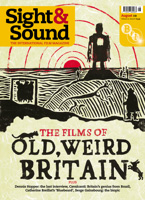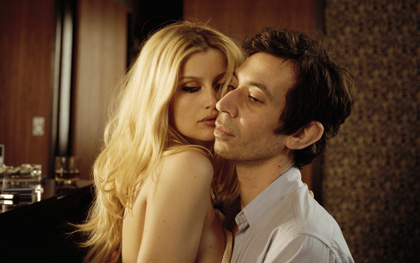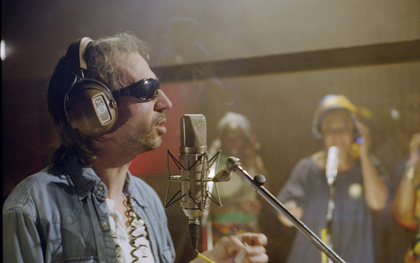Primary navigation


French ‘bande dessinée’ artist Joann Sfar injects a bold poetic dimension into the musical biopic with his inspired account of the life of singer, songwriter and hellraiser Serge Gainsbourg. By Ginette Vincendeau
Since his international reputation is based largely on his notorious 1969 duet with Jane Birkin, ‘Je t’aime… moi non plus’, it’s hard for those outside France to imagine quite how big a star Serge Gainsbourg (1928-1991) was in 20th-century French culture. From the mid-1960s he was ubiquitous in the French media: the high-profile liaisons with the likes of Birkin and Brigitte Bardot, the provocations (singing a reggae version of ‘La Marseillaise’, or ‘Lemon Incest’ with his 13-year-old daughter Charlotte), the drinking, the smoking, the dubious stunts such as insulting celebrities or burning bank notes on live television. Yet he was – and was celebrated as – so much more: a gifted musician who explored an astonishing range of musical styles, from old-fashioned song to techno via pop and reggae; a film-maker and actor; but, first and foremost, a genius of French chanson whose brilliant lyrics elevated him to the status of poet.
Joann Sfar’s biopic chooses not to dwell on the overexposed seedy late Gainsbourg, delving instead into his youth to explore two lesser-known dimensions of his colourful persona: his Russian/Jewish roots and his aspirations as a painter. The film’s one-word French title is followed by two intriguing additions: “vie héroïque” (heroic life) and “un conte de Joann Sfar” (a fairytale by Joann Sfar). According to Jane Birkin, the latter was at the request of the singer’s family, who were anxious the film should not be seen as depicting the ‘real’ Gainsbourg. However, this qualification enables Sfar to exploit his own talents as a cartoonist, departing from the standard biopic by using animation to inject a poetic dimension. In a bold move, Sfar creates alter egos who shadow Gainsbourg – first a grotesque balloon face to mock the anti-Semitic cartoons of the hero’s childhood in Nazi-occupied rance, and then a gangly figure with huge ears and nose (and Edward Scissorhands-style fingers), whose cynicism and confidence contrast with the idealism and shyness of ‘Gainsbourg the sensitive artist’ – who always thought himself outstandingly ugly. If these parallel figures allude to the fact that in later life Gainsbourg referred to his own sinister, self-dubbed alter ego ‘Gainsbarre’ (an untranslatable pun), the accent on childhood ensures an original take by replacing the Gainsbourg/ Gainsbarre parallel with that of Gainsbourg/Ginsburg, the singer’s real name.
Sfar’s decision to highlight Gainsbourg’s Jewish background makes his film (his debut as director) all the more topical. The anti-Semitism of the wartime Vichy regime is very much on the agenda of contemporary French cinema, the domestic release of Gainsbourg preceding by just two months that of La Rafle (The Round-Up), a depiction of the notorious 1942 round-up of French Jews for deportation. At the same time Sfar has drawn on his own cultural heritage, as he did for his award-winning bande dessinée, The Rabbi’s Cat, the film adaptation of which is currently in post-production. Yet while anti-Semitism is unambiguously portrayed in Gainsbourg, Sfar never presents his hero as a victim. The childhood of Lucien Ginsburg (before he became Serge) is seen in a series of warm and humorous vignettes, first of the Russian-Jewish-French milieu in which he grew up, and later of the rural Catholic school where he hid from the Nazis. Sfar simultaneously exposes and makes light of the poisonous anti-Semitism of the Vichy regime, imaginatively showing it as the source of Gainsbourg’s well known defiance and insolence, as in the scene where the boy turns the new obligation to wear the yellow star into an impish joke. At the end of the film this link is made explicit when adult and boy merge as Gainsbourg challenges an audience of paratroopers enraged by his (brilliant) reggae version of the national anthem ‘La Marseillaise’ – an occasion for more anti-Semitic outbursts in some quarters of the French press. In the same way, the precocious sexuality of young Lucien, devouring nude models with his gaze and regaling his friends with explicit erotic drawings, is clearly meant to prefigure the adult Gainsbourg’s sexual iconoclasm.

Though the Jewish childhood scenes and the insights into Lucien’s failed ambitions as a painter help displace clichéd views of Gainsbourg, Sfar does full justice to his subject’s main career too. As a musical biopic, Gainsbourg gives generous expression to the singer-songwriter’s brilliance. Non-French speakers may not get the full allusiveness of his lyrics, which in a very French way combine erudition, slang, poetry and sexual explicitness, but the songs and the performances here more than make up for that, in a narrative which retraces the major steps in Gainsbourg’s musical trajectory from obscure pianist to cabaret artiste to major pop-culture phenomenon. En route we get a selective glimpse of the roll-call of glamorous female singers who made both their own and his fortunes by singing his songs. (In real life they included not just Birkin and Bardot but Juliette Gréco, Anna Karina, Françoise Hardy, Isabelle Adjani and Catherine Deneuve).
Three of the film’s musical episodes in particular stand out. The stunning Anna Mouglalis embodies the dark sensuality of Juliette Gréco, who at the height of her fame was one of the first to spread Gainsbourg’s name with ‘La Javanaise’, still one of his best-known songs. Sara Forestier gives a hilarious performance as France Gall, the singer who helped propel Gainsbourg into the mass-media stratosphere. But the high point of the film is Laetitia Casta’s sensational turn as Brigitte Bardot. Her regal entrance complete with thigh-high boots and dog on leash (apparently based on a real episode) and her exuberant performance of ‘Comic Strip’ are moments to treasure. Like the little-known Eric Elmosnino as Gainsbourg, Casta uncannily resembles her model. Both use their own voices, as does the young British actress Lucy Gordon, who makes a charming Jane Birkin (but sadly died before the film was released).
It could be objected that Gainsbourg is too respectful; to be sure, it skips lightly over the serial womanising and the misogyny, the family breakdowns and heartbreaks, the sleazy feature films, the unsavoury stunts and embarrassingly drunken performances, all too familiar to French television viewers. As with other recent musical biopics (Dreamgirls, Walk the Line), Gainsbourg’s recreations of events have to compete with readily available television and internet images, which only point up the gaps between competing sets of interpretations. But then Sfar deliberately announces his film as a “heroic life” and a “fairytale”, combining the classic ingredients of the biopic – the toiling in obscurity, the Pygmalion figures, the setbacks and the triumphs – with an original approach to both his subject and the genre. By casting his ‘hero’ in a favourable light and steering clear of the squalid, unshaven ‘Gainsbarre’, Sfar reminds fans and newcomers alike why in spite of everything Serge Gainsbourg remains such a national treasure. In conjoining Jewish heritage and classic French chanson, Gainsbourg celebrates the hybridity of contemporary French culture, while its combination of realist narrative and poetic animation make it both a touching biopic and an inspired musical.
Joann Sfar talks about his unique take on the life of Serge Gainsbourg on page 47 of the August 2010 issue of ‘Sight & Sound’
From the strip to the screen: Guillaume Gendron on the movie careers of maverick French comic-strip artists (online, July 2010)
Nowhere Boy reviewed by Trevor Johnstone (Film of the Month, January 2010)
French cinema now: Jonathan Romney on the diversity of French talent and its poor UK representation (May 2008)
Brigitte Bardot 5-Film Collection reviewed by Tim Lucas (DVD, December 2009)
An American in Paris: 'The Delirious Fictions of William Klein' reviewed by Tim Lucas (DVD review, May 2008)
Dreamgirls reviewed by Linda Ruth Williams (Film of the Month, March 2007)
Walk the Line reviewed by Mark Kermode (February 2006)